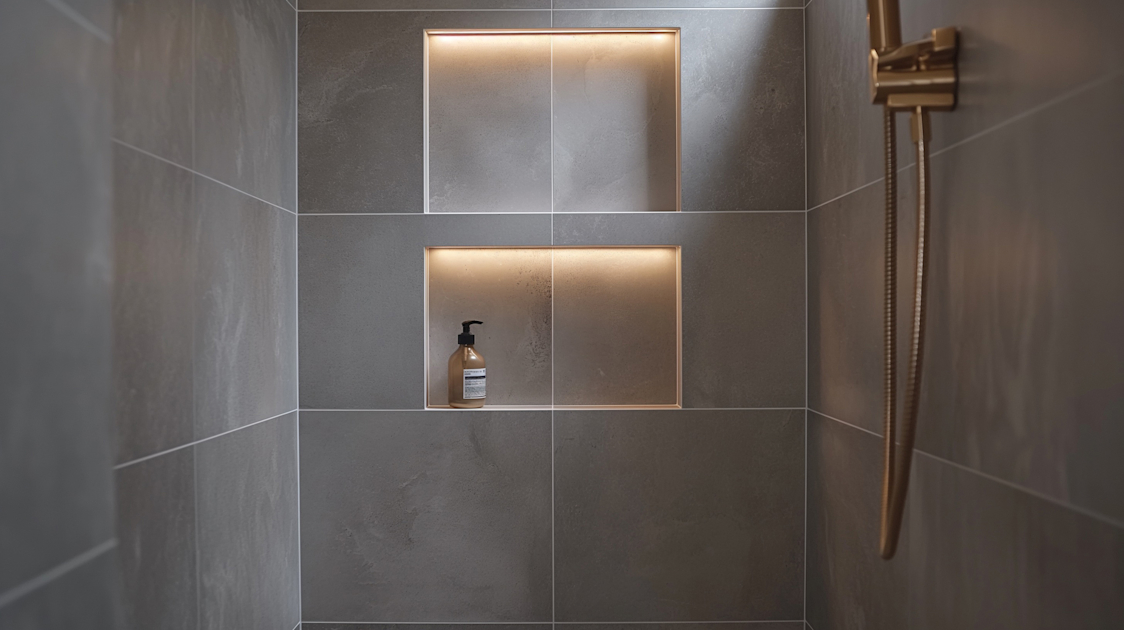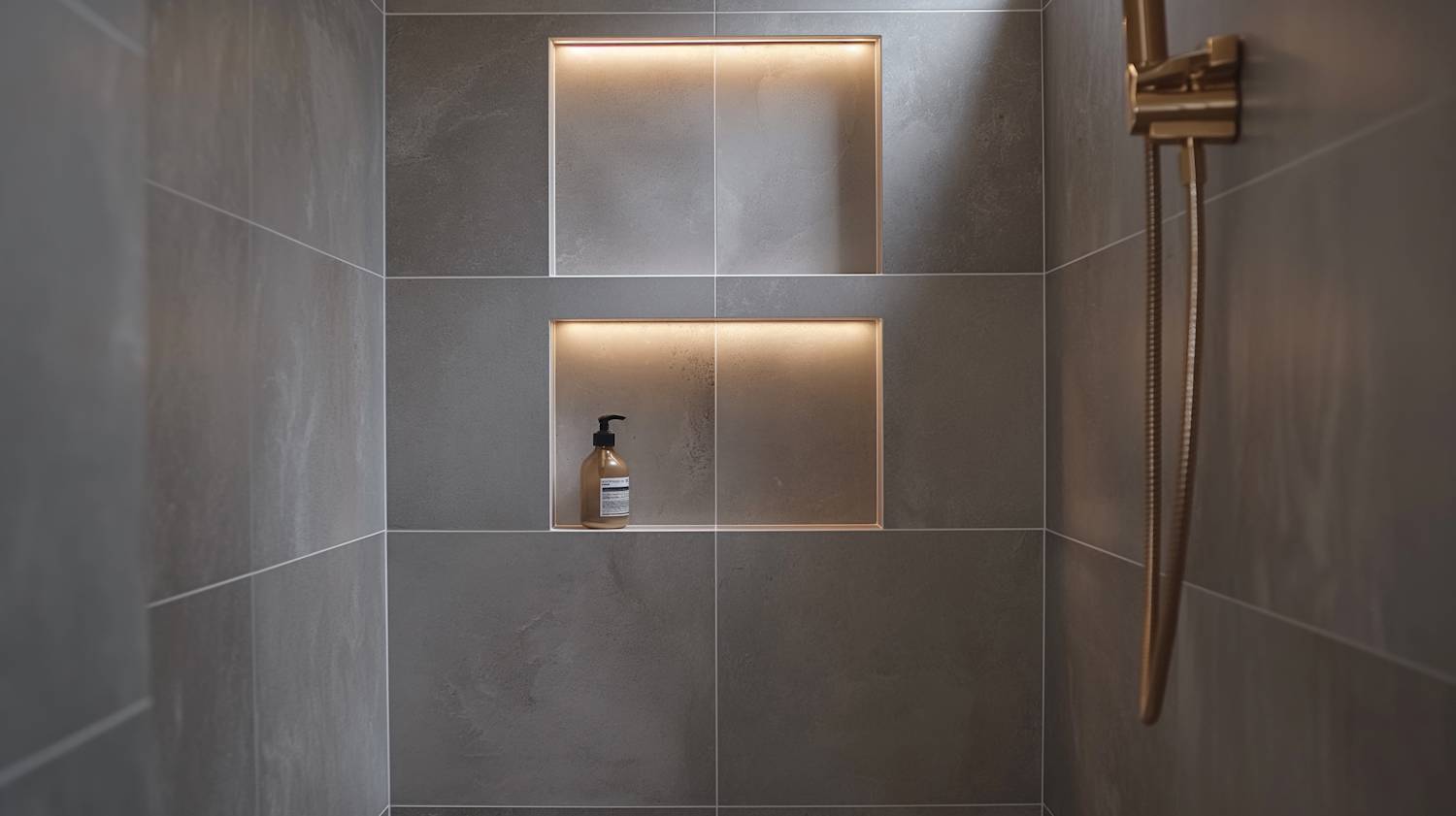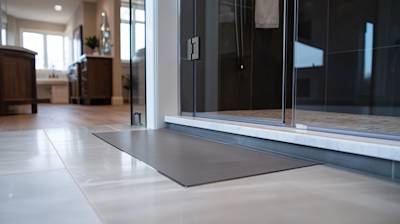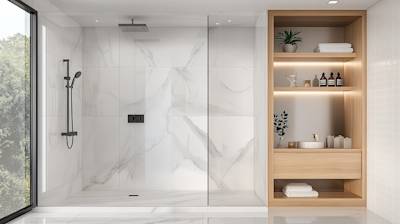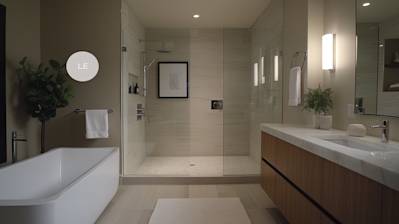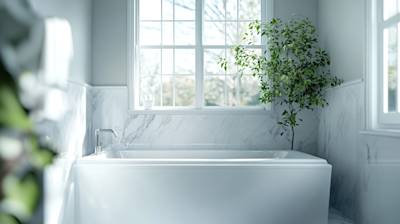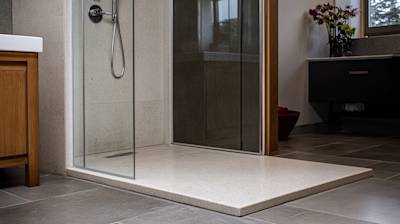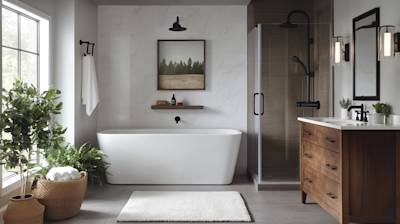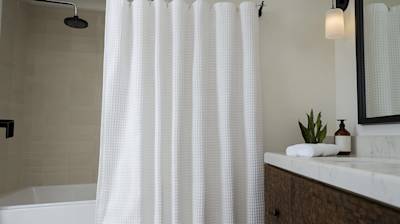Ceramic tile showers are a wonderful addition to any bathroom. They offer both function and beauty, making them an irresistible choice for many homeowners. With their diverse shapes, sizes, colors, and textures, you can create a unique shower design that seamlessly fits into the bathroom's aesthetic. Moreover, the durability and easy maintenance of ceramic tiles make them an ideal choice for wet areas like showers. Now let's dive deeper into the world of ceramic tile showers and explore how they can revamp your shower time, as well as the installation process and maintenance tips.
What is a Ceramic Tile Shower?
A ceramic tile shower refers to one where the walls, and sometimes the floor, are covered with ceramic tiles. These tiles are composed of clay that's fired at high temperatures to reduce water content and increase strength. This results in highly durable materials that are perfect for high-moisture areas like bathrooms.
Why Choose a Ceramic Tile Shower?
When looking to remodel your bathroom, a ceramic tile shower should be at the top of your options list. Here's why:
-
Durability: Ceramic tiles are known for their toughness. They can last for many years without chips or cracks, even in high-traffic areas.
-
Easy Maintenance: Cleaning ceramic tiles is a breeze. They can be cleaned with most mild detergents or just warm water.
-
Design Versatility: With various designs and styles available, ceramic tiles allow you to create a shower that reflects your personal style.
-
Water-Resistant: Ceramic tiles have a glazing on the surface that makes them resistant to water and staining.
Key Features to Consider When Choosing Ceramic Tiles for Your Shower
There are several factors to consider to make the most out of your ceramic tile shower:
Ceramic Tile Size
The tile size can make a significant difference in your shower. Small tiles are suggested for curved or sloping areas, while larger tiles work best on straight, flat surfaces. Larger tiles also mean fewer grout lines, resulting in a more seamless look.
Ceramic Tile Shape
From traditional squares and rectangles to unique hexagons and arabesque shapes, the options are plentiful. Your choice will greatly influence the overall design of your shower.
Ceramic Tile Color
While many lean towards neutral colors for a timeless appeal, vibrant colored ceramic tiles can add a pop of personality to your shower. Mixing and matching different colors can also create a stunning visual effect.
Installing a Ceramic Tile Shower
Installation of a ceramic tile shower involves several steps, including preparing the shower area, planning the layout, applying adhesive, laying the tiles, grouting, and sealing. If you want a flawless finish, it's recommended to hire a professional. However, if you’re adept at DIY projects, remember to follow the manufacturer's installation instructions meticulously.
Maintenance Tips for Ceramic Tile Shower
To keep your ceramic tile shower looking its best, follow these maintenance tips:
- Clean regularly with a mild detergent.
- Don't use abrasive cleaners that can damage the tile surface.
- Inspect and replace grout when necessary to prevent water from seeping behind the tiles.
- Seal the tiles periodically to maintain their resistance to moisture and stains.
A ceramic tile shower is a beautiful, practical, and durable option for any bathroom. With a myriad of design options at your fingertips, you can create a shower that's effortlessly stylish and easy to maintain. Whether you’re going for a sleek modern design or a traditional style, ceramic tile showers offer an unparalleled combination of versatility, durability, and elegance.
Frequently Asked Questions about Ceramic Tile Showers
What types of ceramic tile are best for showers?
There are many types of ceramic tiles suitable for showers, including glazed ceramic, porcelain, and terracotta. While porcelain is technically a type of ceramic, it's made from a different type of clay and tends to be harder and less porous, making it a good choice for shower areas. Glazed ceramic tiles, another popular option, are also highly water-resistant.
How do I maintain a ceramic tile shower?
Ceramic tile showers are extraordinarily easy to maintain. Regular cleaning with warm water and a mild detergent is usually enough to keep your tiles looking fresh. Rinse well to refrain from leaving any soap residue, which might dull the tile's shine over time. Also, consider sealing grout lines every year to prevent water seepage.
How often should ceramic tile showers be cleaned?
To maintain optimal cleanliness and longevity, ceramic tile showers should be cleaned at least once a week. The cleaning frequency might vary depending on how often the shower is used. Keep a squeegee handy to remove excess water after each use, and scrub the tiles and grout regularly with a gentle cleaner to avoid any mold or mildew growth.
Can ceramic tile be used on shower floors?
Yes, ceramic tiles can be used for shower floors. However, ensure that you choose tiles with a slightly rough texture or a slip-resistant surface to prevent accidents. Small to medium-sized tiles are typically recommended for shower floors, as they are easier to slope for proper drainage and provide better grip due to more grout lines.
How do I select the right color of ceramic tile for my shower?
Choosing the right color for your ceramic tile shower primarily depends on your personal aesthetic preferences and the overall bathroom style. Lighter colors can make a small space feel larger and brighter, while darker tones can add depth and sophistication. Consider coordinating or contrasting your tile color with other fixtures and decor elements in your bathroom for a harmonious effect.
What kind of design options are available for a ceramic tile shower?
Ceramic tiles come in a vast array of designs, allowing you to create any look you desire. From traditional square tiles to decorative shapes and mosaics, you're sure to find something that suits your aesthetic. Additionally, ceramic tiles are available in various finishes, such as glossy, matte, and textured, contributing to your overall design scheme.
Are ceramic tile showers durable?
Yes, one of the significant advantages of ceramic tile showers is their durability. Ceramic is known for its strength and can stand up well to daily wear and tear. With proper installation and maintenance, a ceramic tile shower can last many years looking just as fantastic as the day it was installed.
How is a ceramic tile shower installed?
The process of installing a ceramic tile shower can be quite complex and is typically best left to professionals. It involves a series of steps such as framing the shower area, installing a shower pan and waterproof membrane, laying out the tiles, securing each tile with mortar, letting it dry, and applying grout. It is crucial to ensure a waterproof seal and correct slope for effective drainage.
Can I install ceramic tile over my existing shower surround?
While it's possible to install ceramic tile over an existing shower surround, it's not always recommended. Any issues with the existing surround, such as leaks, mold, or structural damage, could affect the new installation's longevity and performance. It's usually best to remove the old surround for a thorough inspection before establishing a new ceramic tile shower.
Do ceramic tile showers add value to my home?
Indeed, a well-installed, good-quality ceramic tile shower can add significant value to your home. They are often viewed as a luxury by potential home buyers and may make your home more desirable if properly maintained. Plus, their durability ensures that they'll remain a valuable feature for years to come.
Pros and Cons of Ceramic Tile Showers
Pros of Ceramic Tile Showers
Diverse Design and Style Options
-
Ceramic shower tiles come in a wide variety of styles, sizes, shapes, and colors, providing unlimited design possibilities.
-
They can mimic the look of natural stone, wood, or other materials, enabling homeowners to match their shower's look with the existing decor.
-
Artisans can paint unique patterns and designs on ceramic tiles, allowing for personalized and creative expression.
Durability and Longevity
-
Ceramic tiles are known for their hard-wearing nature, they resist scratches, stains, and dents effectively.
-
They do not warp or fade due to moisture or sunlight exposure.
-
With proper installation and maintenance, ceramic tile showers can last for many years, often outliving other shower material options.
Hygiene and Maintenance
-
Ceramic tiles are resistant to mold and mildew, ensuring a healthier shower environment.
-
They are easy to clean with simple household cleaners, and do not require special, expensive products.
-
The smooth, hard surface of ceramic tiles discourages the buildup of grime and dirt.
Cons of Ceramic Tile Showers
Installation
-
Ceramic tile showers can be challenging and time-consuming to install due to the complex layout, cutting, and adjusting of tiles. This often requires hiring a professional, which adds to the overall cost.
-
Improper installation can lead to unevenness, unsightly gaps, or potential water leaks. This underscores the need for professional installation.
Cold Underfoot
-
An attribute often noted by homeowners is that ceramic tiles can feel cold underfoot, especially during winter. Though this may not bother everyone, it can be a significant drawback for those sensitive to cold.
-
The inclusion of in-floor heat systems can remedy this but adds to the overall cost and installation complexity.
Slipperiness
-
Many ceramic tiles, particularly the glossy ones, can be slippery when wet. This is a considerable safety concern, especially for families with young children or elderly members.
-
Anti-slip ceramic tiles are available, although the choices are somewhat more limited in terms of designs and styles.
Maintenance
-
Grout lines between ceramic tiles can become discolored and dirty over time. Regular cleaning and periodic resealing are necessary to preserve the shower's appearance and integrity.
-
Despite ceramic tiles' durability, they can crack if a heavy object falls on them. Repairing or replacing the damaged tile can be a hassle.
Summary
A ceramic tile shower can, without a doubt, transform the look of any bathroom due to its durability and range of design options. This shower variant is not only easy to clean but also doesn't harbor germs. A ceramic tile shower truly brings together utility and beauty, a combination that can elevate your shower experience to an entirely different level while simultaneously adding enormous value to your home.
The customization options available with a ceramic tile shower are nearly endless. From bright hues to subtle shades, glossy to a matte finish, intricate designs to minimalist styles, there's a tile fit for every vision. With the right tile, patterns and color scheme, a ceramic tile shower gives homeowners the opportunity to manifest their unique style statement and aesthetic preferences in a daily-use twin application.
A ceramic tile shower is more than just a focal point in your bathroom. Beyond its aesthetic appeal, the considerable cost-effectiveness and hassle-free installation make it an excellent investment for homeowners. With a ceramic tile shower, you are blending style, practicality, and longevity, creating a space that is enjoyable for you to use and is all set to impress potential buyers in the future.
About GVD Renovations & Remodeling
Meet GVD Renovations & Remodeling, your trusted partner in the Sacramento, CA area for a wide range of home renovation needs. With years of experience under our belts, we have mastered the art of transforming houses into dream homes. Our team excels in everything from kitchen and bathroom remodels, to siding and window replacements. We're not just in the business of renovations; we're in the business of turning houses into homes, and we're committed to making your vision come to life, delivered with top-notch craftsmanship and exceptional customer service.
Tags: bathroom renovation, shower design, home improvement,



